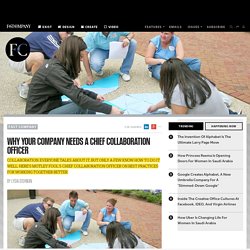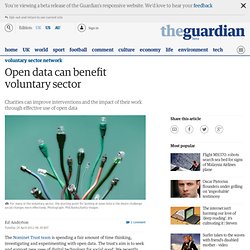

It’s Not What You Know, It’s How You Learn. Learning to end poverty. Why Your Company Needs A Chief Collaboration Officer. Collaboration.

It’s a $1 billion industry, according to an ABI Research study on worker mobility and enterprise social collaboration. And it's projected to grow to $3.5 billion by 2016. No wonder lots of ink has been spilled on this business buzzword on everything from how to start (hint: build trust) to doing it better with social platforms, to using it as a way to achieve that holy grail of business: innovation. Two years ago, the Harvard Business Review even touted the need for another C-suite executive: the CCO. A chief collaboration officer would be charged with integrating the enterprise as companies scramble to innovate from within. But in an ideal scenario, this most critical of business strategies would have a dedicated individual toiling to make collaboration part of the daily doings of the company.
Todd Etter, one of the founders of the multimedia financial-services company that dishes advice on stocks and personal finance, has held the title for the past two years. Pulling informal learning. Take a look at these 8 demand-side knowledge management principles by Nick Milton.

People don’t pay attention to knowledge until they actually need it.People value knowledge that they request more highly than knowledge that is unsolicited.People won’t use knowledge, unless they trust its provenance.Knowledge has to be reviewed in the user’s own context before it can be received.One of the biggest barriers to accepting new knowledge is old knowledge.Knowledge has to be adapted before it can be adopted.Knowledge will be more effective the more personal it is.They won’t really know it until they do it. They highlight the difference between Push and Pull learning. Training is Push. Informal learning is mostly Pull. Look at what Push can mean in the context of demand-side KM: How often are training courses aligned with the moment of need? There are many do-it-yourself applications available today that let people take control of their learning. Open data can benefit voluntary sector.
The Nominet Trust team is spending a fair amount of time thinking, investigating and experimenting with open data.

The trust's aim is to seek and support new uses of digital technology for social good. We recently co-hosted a conference on charities and open data with the Big Lottery Fund and NCVO, which indicated a growing interest from the voluntary sector. The opening of public sector data over the past few years is one obvious stimulus for this, particularly since many charities are data suppliers due to their work delivering a public service contracts. For many in the voluntary and charitable sector, the starting point for these conversations is the desire to be more effective in addressing social challenges. Whether this is the remarkable intrinsic motivation of wanting to support the communities more effectively, or the extrinsic motivation of doing more with less, the starting point isn't technology, but making the most of the resources we have.
But this isn't new. Open Data. RSA Animate - The Power of Networks. Collaborative learning.